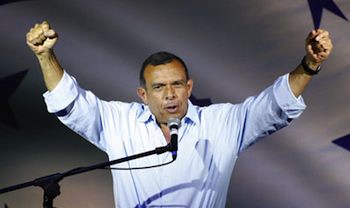- MENU
- HOME
- SEARCH
- WORLD
- MAIN
- AFRICA
- ASIA
- BALKANS
- EUROPE
- LATIN AMERICA
- MIDDLE EAST
- United Kingdom
- United States
- Argentina
- Australia
- Austria
- Benelux
- Brazil
- Canada
- China
- France
- Germany
- Greece
- Hungary
- India
- Indonesia
- Ireland
- Israel
- Italy
- Japan
- Korea
- Mexico
- New Zealand
- Pakistan
- Philippines
- Poland
- Russia
- South Africa
- Spain
- Taiwan
- Turkey
- USA
- BUSINESS
- WEALTH
- STOCKS
- TECH
- HEALTH
- LIFESTYLE
- ENTERTAINMENT
- SPORTS
- RSS
- iHaveNet.com
Andres Oppenheimer

There is a lot of speculation that Chile's president-elect, Sebastián Piñera, a
True, Piñera -- who will become Chile's first center-right president after two decades of center-left governments -- criticized both Venezuela and Cuba during the campaign. He also supported expanding the
Venezuelan President Hugo Chávez, who has used his country's oil wealth to create a "Bolivarian" bloc of radical leftist countries in Latin America, reacted with characteristic vitriol following Piñera's victory, warning him "not to mess with us."
But members of Piñera's inner circle tell me that Chile's new government will not create an anti-Chávez bloc with Colombia, Peru, Mexico, Panama and Honduras to openly confront Chávez's expansionism in the region.
Cristian Larroulet, one of Piñera's top aides, who is mentioned in the Chilean media as the upcoming government's likely chief of staff, told me in a telephone interview Friday that the president-elect will be a pragmatic leader who will prioritize cooperation and good relations with other Latin American countries.
Does that mean that nothing will change in Chile's foreign policy? I asked. Larroulet said there will be a significant change: Chile will start defending much more enthusiastically its successful free-market development model, which has helped reduce poverty from 43 percent to 13 percent of the population over the past two decades.
"He will be explicit in defending and upholding what have been the fundamental factors of Chile's success, which are a democracy based on strong institutions and a free market economy," he said.
That would be a major difference with the outgoing government of President Michelle Bachelet, which has been shy in its defense of Chile's free market, pro-globalization model because it was against the core socialist beliefs of its political base, other senior Piñera aides told me.
DEFENDING CAPITALISM
In other words, Piñera will defend capitalism while not picking fights with Chávez or his leftist Bolivarian bloc members. As another top aide to Piñera told me, the president-elect "will not buy into the idea of creating two Latin Americas, a leftist one and a rightist one. His message will be a positive one."
Other sources outside the Piñera team say there are practical reasons why Piñera is unlikely to form an anti-Chávez coalition. Politically, most of Latin America's anti-Chávez leaders are inconvenient bed fellows for Piñera at home, they say.
A Piñera alliance with Colombia would irk Chile's vocal human-rights community; a partnership with Peru would be difficult because of Chile's ongoing border dispute with that nation; a bloc with Mexico is unlikely because the North American country is too consumed with its war on drug cartels, and a close association with Panama's center-right President Ricardo Martinelli would be criticized as a club of business tycoons.
"Piñera won't find many potential friends in Latin America, and those he will find won't be good for him
domestically," says
My opinion: Piñera will be a center-right version of Brazil's center-left President Luiz Inácio Lula da Silva, who publicly supports his friends in Latin America's left without openly criticizing those to his right.
Chile won't become the spokesman for an anti-Chávez bloc. But that could change later this year if Brazil's centrist candidate, Jose Serra, wins the election and Latin America's biggest country stops its enthusiastic support for leftist autocrats in the region.
A POLITICAL SHIFT
That would be a game-changer, tilting Latin America's political balance sharply toward the center.
If that happens, Piñera would feel much freer to speak out against the imperial designs of Venezuela's narcissist-Leninist leader. Barring a change in Brazil, however, his foreign policy's main principle will be pragmatism.